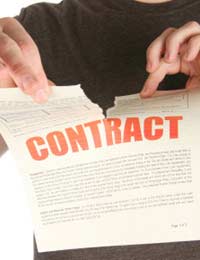How to Defend a Claim or Counterclaim

If you are being sued in the small claims court you should remember that it is for the claimant to prove their case, not for you to disprove it. If the claimant cannot prove that the case against you is ‘more probable than not’ to have occurred they will not succeed. Remember, though, that it is for the judge at the final hearing to decide this and so it is very important that you ensure that you are well prepared to defend yourself.
Similarly if you are the claimant who is defending a counterclaim, the defendant will need to prove the required elements of their counterclaim. So how do you defend yourself in the small claims court? It depends on the nature of the case against you. Please note that the following is not intended to be an exhaustive list of applicable defences but provides guidance on the types of allegations defendants often face in the small claims court:
Owing the Claimant Money
- If the claimant is alleging that you owe them money and you are refuting it, it may be because you have either:paid them in full, or
- not paid them because it was a gift, or there was no agreement for payment to be required
- or that the goods that the claimant supplied under the contract were not fit for purpose, as described or of satisfactory quality or a service the claimant provided was not carried out with reasonable care & skill, or within a reasonable period of time or for a reasonable fee (unless these requirements have expressly been waived) and that this justifies the full amount of your non-payment.
Injuries Caused to the Claimant
In terms of personal injury cases in the small claims court, to defend a claim you need to demonstrate to the court that you did not:- play any role in the occurrence of the claimant’s injury, whether directly, vicariously (your employee’s negligence) or by failing to do something, e.g. by not observing health and safety laws, or
- that the claimant was to blame for his or her own injuries, or
- that the claimant’s injuries were not reasonably foreseeable (e.g. if the claimant is playing tennis on your property, and a horse which is being ridden by a member of the public comes into the court and knocks them over, this would not be reasonably foreseeable)
Supply of Good or Services to a Consumer
If you are a seller or supplier who has contracted with the claimant in the course of your business, and the claimant is alleging that the goods you sold or services you supplied are unsatisfactory, you should be confident that you have:- Done everything that you can to resolve the situation (i.e. acted ‘reasonably’)
- Provided goods or services that meet the required statutory standard of the Sale of Goods Act or the Supply of Services Act. If you have not done this to the required standard, you should have offered a consumer a repair or replacement (if a repair is too costly, you can replace the item at your discretion.)
- It is important to note the various timescales in terms of the Sale of Goods: it is normally the claimant’s job to prove that the goods were faulty and should have lasted longer than they had. However, if the claimant asked for the goods to be repaired or replaced within 6 months of purchase, it is for you as the seller to prove that the goods were not faulty at the time of purchase. After the first six months, and until the goods are six years old (the limit) the claimant must prove the inherent fault at the time of purchase.
Breach of Contract
If you are defending an alleged breach of contract typical defences are:- That there was no contract, or
- That you were not a party to the contract with the claimant, or
- That if there was a contract you did not breach it, or that if you breached it, it was not within your reasonable control to prevent the breach, or
- That if there was a breach and the claimant is claiming damages for their loss, that loss could not have been reasonably foreseeable by you.
Business Energy With a Difference
If you are looking for business energy or need advanced solutions like remote energy monitoring, new supplies, downgrading or upgrading capacity, have a no obligation chat with Purely Energy.
To find our more get in touch here. or call 0161 521 3400.







